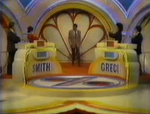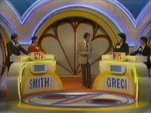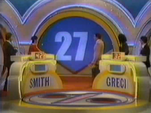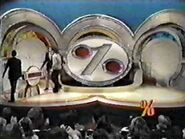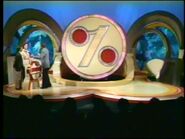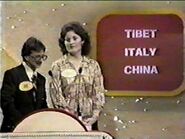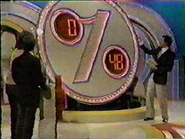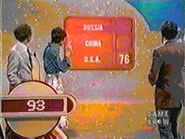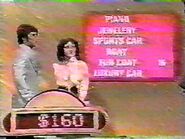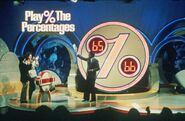| Host | |
| Geoff Edwards | |
| Announcers | |
| Jay Stewart Bob Hilton | |
| Broadcast | |
| Pilot: 11/2/1979 Syndication (Daily): 1/7/1980 – 7/4/1980 (reruns were shown until 9/12/1980) | |
| Packager | |
| Barry & Enright Productions | |
| Distributor | |
| Colbert Television Sales | |
Pilot:
Stewart:"During the next 30 minutes, intuition could win our players $48,000 in cash, because...it's time to challenge everybody's knowledge! It's time to PLAY THE PERCENTAGES!
Singers: Play the percentages, here's Geoff to show you how...
Stewart:...And here he is, our host, GEOFF EDWARDS!"
1st Intro (Couples):
"During the next 30 minutes, intuition could win our players (insert jackpot amount) in cash, because…it's time to challenge everybody's knowledge! It's time to PLAY THE PERCENTAGES! And now, here's our host, GEOFF EDWARDS!"
+As of February 1980, the jackpot was no longer mentioned at the start.
2nd Intro (Solo Players):
"This is the show in which people determine the difficulty of the questions. Let's PLAY THE PERCENTAGES! And here's our host, GEOFF EDWARDS!"
Play the Percentages was the short-lived, Barry & Enright game show in which contestants (originally couples later solo players) answered questions which were previously asked to hundreds of people.
Gameplay[]
This game was based on the percentage of hundreds of people who got the questions right & wrong. It had many different versions during its nine-month run.
Main Game[]
Format #1[]
Two married couples played the game. Two players, one from each team and of the same sex (women vs. women & men vs. men), listened to a question posed by Edwards. They each estimated what percentage of the 300 people polled got the question right. If their estimates matched, they were erased and then they had to estimate again. The player closer to the actual answer, higher or lower, earned the actual percentage as points. If the percentage was in between the players guess, then no points were awarded and the question was thrown out. Then the player with the closer percentage could decide to either answer the question himself/herself or challenge his/her opponent(s). A correct answer scored the remaining percentage points, but an incorrect answer from the first player gave the opposing team a chance to answer. Upon a challenge, if the challenged player was right, he/she took the points; if the challenged player was wrong, then the challenger won the points; during the pilot and the first month of the series, a successful challenge also won a chance to add more points by answering the question himself/herself with no penalty for a wrong answer.
The first couple to score 300 or more points or hit the actual percentage on the nose won the game and $300. Later, any team who hit the actual percentage on the nose not only won the game, but also won an increasing jackpot which started at $10,000 and grew by $1,000 for every game it was not won.
Format #2[]
Married couples were eliminated in favor of having two solo contestants. Each game in this format has three categories: the first two were category preferences of the two competing players while the last one was the "Potluck" category. The game was played in up to five rounds. In each round, lights of the categories flashed and wherever the light stopped was the category that would be played in that round. Each player had a turn in answering the question first and on each question. The player in control selected a point value from 10 points to 90 points: the higher the point value, the harder the question; the difficulty for each question was determined by the percentage of people who missed the question. A correct answer added points to the player's score, but an incorrect answer gave the opposing player a chance to answer. If the light landed on "Potluck", the two questions in that round were toss-ups with the first player to buzz in with the correct answer earning the points. In the final weeks of the show, all questions were toss-ups no matter what category it was. The first player to reach 250 points won the game; if neither player reached 250 after the fifth round, the player with the most points chose the category for the game-winning toss-up question. The winner of the game earned $500 and went on to the bonus game.
Bonus Game[]
Pilot[]
The pilot bonus game was vaguely similar to The Price is Right pricing game Lucky Seven with the essence of Family Feud and somewhat similar to the main game.
In this pilot bonus, the winning couple was given 100 points to start with, and then Edwards read five questions polled to a polling group. Edwards read each question one at a time, followed by the correct answer. As with the main game, but with the correct answer not revealed, the winning couple estimated what percentage of the group got the question right. After all five questions were played, the actual percentages to each question were revealed one by one and the couple lost points based on the difference between the two percentages (the actual one & the couple's). So the closer they were, the greater the couple's chances are of winning; if they lost all their points at any time, they lost the bonus round.
If the winning couple had any points leftover after three questions, they won $500; if the winning couple could stay in the game with points leftover after four questions, they won $1,000; and if the winning couple didn't lose it all after all five questions, they won $3,000. Finally, if the winning couple's percentage guess matched the actual percentage at any time, they won an increasing jackpot which started at $25,000 and grew by $1,000 for every bonus game it was not won.
Format #1[]
In this bonus, Edwards read questions previously answered by 100 people. Each question has three possible answers. Two of them were mentioned by the people polled (one of them being the most popular answer, and the other had a lesser score), but one wasn't and that scored zero, and of course one of them was the correct answer which could or could not be scored. The winning couple took turns answering each question, and their job was to choose an answer that was mentioned by the people polled. Doing so earned percentage points attached to that answer, but choosing the one that scored zero ended the bonus game. After each successful question, the winning couple could decide to stop and collect $10 for every point made in the bonus (ex: 55×10=$550). If the winning couple could reach 100 points or more, they won $2,500.
Version 1.0[]
To start, the winning couple selected a jackpot target percentage which can be any number besides zero. If at any time the winning couple chose an answer that matched the jackpot percentage, they won the jackpot.
Version 1.1[]
The jackpot target percentage was dropped when the red circle readouts that house the percentage numbers in the giant percent sign below the podiums malfunctioned. Other than that, the bonus remained the same; the jackpot carried over into the main game. Plus, the winning couple can now earn more points by choosing the other answer that was scored.
Format #2[]
In this bonus, instead focusing on people's knowledge, this bonus focused on people's feelings or opinions. This time, only one question was asked with six possible answers. Five of them were said by the people surveyed and one was not, scoring zero. The winning couple picked off answers one at a time, and each answer that was mentioned in the survey won $10 a percentage point. Getting all five correct answers won $2,500 (later changed to $1,000 & a prize package). Picking the answer that got no response at all lost the money, which was why the couple always had the option to stop after each correct answer.
To ensure that the percentage points in this format always added up to 100%, the points awarded were based on the percentage of the people who responded with that answer in relation to the five most popular answers of that survey, not the actual number of people who gave that answer.
This bonus was carried over into the solo player format. The winning player could call for somebody from the audience for moral support, but only that contestant was free to answer.
From February 18 until the program's cancellation, the same prize package was at stake for the entire show until won.
Champions stayed on the show until defeated. Just like many Barry & Enright game shows, five-time champions won a new car.
Gallery[]
Press Photos[]
Tickets[]
Pilot[]
Music[]
Hal Hidey
Studio[]
KCOP Television, Los Angeles, CA
Trivia[]
- 130 episodes were produced.
- During the second main game format, host Geoff Edwards had a funny rapport with the show's judge Eric Warner, whom he addressed as "Judge Von Erik."
- The buzzer sound heard during the second main game format would later find its way to the Barry & Enright hit Tic Tac Dough with the return of the Jump-In categories and red buttons on the podium. Geoff Edwards was originally chosen to do Tic Tac Dough, but the job went to Wink Martindale instead.
- The show's theme music was later reused on Nipsey Russell's Juvenile Jury.
Tagline[]
"Until next time, this is Geoff Edwards hoping the percentages are always in your favor." - Geoff Edwards (1980)
Links[]
Rules for Play the Percentages @ Loogslair.net
The Play the Percentages Page @ Game Show Utopia
Matt Kaiser's Play the Percentages Page
Screengrabs of Play the Percentages
YouTube Videos[]
The Pilot[]
Montage[]
This is a montage of exciting & humorous moments of Play the Percentages.



